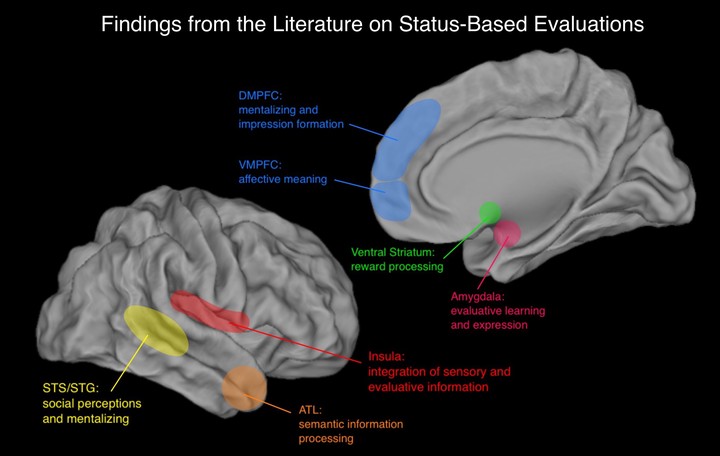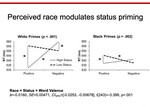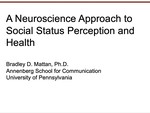Status-Based Evaluation
 Current Opinion in Psychology, 2018
Current Opinion in Psychology, 2018
Across various projects with my collaborators in the Impression Formation Social Neuroscience Lab, I have been actively studying how we perceive social status in others and how perceived status ultimately shapes the evaluations and decisions we make about others.
Perceiving Status in Others
Recent empirical and theoretical work suggests that visible cues of status such as clothing may shape impressions differently than when status is learned through person knowledge (Mattan & Kubota, 2020; Mattan, Kubota, & Cloutier, 2017; Mattan, Wei, Cloutier, & Kubota, 2018). In a pair of ongoing studies, I will be examining how we differentiate socioeconomic status (SES) based on visible cues such as clothing and more abstract or knowledge-based cues. In another study, I will be examining the assumption based so far on correlational methods that the inferior parietal cortex is responsible for status differentiation. Using transcranial magnetic stimulation (TMS) and mouse tracking, I will test the causal role of this brain region in differentiating hierarchical rank based on person knowledge. In sum, my research highlights both the ways that status can be inferred and the potential neural mechanisms underlying our ability to track our own and others’ positions within a given social hierarchy.
Status-Based Evaluations
My main line of work in this project demonstrates that perceived status in conjunction with salient social categories (e.g., race) can elicit spontaneous effects in person evaluation. In a series of five experiments (Mattan, Kubota, Venezia, Li, & Cloutier, 2019), I found consistent implicit evaluative bias as a function of perceived SES (i.e., high SES more positive than low SES). These experiments nonetheless revealed some boundary conditions for this novel status priming effect. For example, we found that status priming tended to be larger for White than Black targets.
In another study, I used fMRI to examine neural activity in 61 White participants as they formed impressions of Black and White targets (Mattan, Kubota, Dang, & Cloutier, 2018). Univariate analyses revealed that external motivation to respond without racial prejudice (EMS) may attenuate the positive value (e.g., decreased blood flow in the VMPFC, NAcc) and/or salience (e.g., decreased blood flow in the NAcc, amygdala) of high status in a mixed-race context. A separate multivariate analysis (behavioral partial least squares) revealed that EMS was associated with overall less coordination of brain activity (irrespective of target race and status) within networks previously implicated in affect regulation, introspection, and social cognition (Mattan, Kubota, Li, Dang, & Cloutier, 2018). These findings open the door to future studies examining the contributions of this network to difficulties experienced by high-EMS individuals when navigating interracial interactions.
Taken together, my research on status-based evaluations indicates that race and status biases can spontaneously arise in implicit evaluations and neural responses, potentially compounding existing racial disparities. However, socioeconomic disparities extend beyond race. In my recent work, I have begun to examine the intersections of status with gender. Linking diverse strands of research from social psychology, evolutionary psychology, and social neuroscience, In a registered report (Mattan & Cloutier, 2020) I found that men show greater implicit pro-wealthy bias than do women in a large pre-existing online sample from the Attitudes, Identities, and Individual Differences Study. This work is complemented by an independent fMRI study showing that men show greater responses to high (vs. low) SES targets during impression formation in brain regions associated with positive evaluations such as the VMPFC and nucleus accumbens (Barth, Mattan, Dang, & Cloutier, 2020).
Perceived Status and Decision Making
Extending my work into the domain of decision making, I examined the role of perceived financial status in evaluations of unfair financial offers (e.g., Justice Game: Mattan, Barth, Thompson, FeldmanHall, Cloutier, & Kubota, 2020). I found that participants tended to favor the party with presumed lower standing—-this was the case even among participants reporting above-average subjective SES. Finally, punitive responses were also more likely when the context emphasized the privileged SES of the allocator rather than the underprivileged SES of the recipient. In more recent work, I have been investigating trust decisions in the context of a series of one-off investment decisions. Here, I find that people prefer to invest more in high-status partners, regardless of whether status is ascribed through color-coding or inferred through clothing. In sum, my decision-making work provides evidence that social hierarchy has important consequences for how individuals intervene to (re)distribute resources.
Relevant Publications
Mattan, B. D., Kubota, J. T., Venezia, S. A., Li, T., & Cloutier, J. (2019). Implicit evaluative biases toward targets varying in race and socioeconomic status. Personality and Social Psychology Bulletin, 45, 1512-1527. Mattan, B. D., Kubota, J. T., Li, T., Dang, T. P., & Cloutier, J. (2018). Motivation modulates brain networks in response to faces varying in race and status: A multivariate approach. eNeuro, 5(4), e0039-18.2018.



